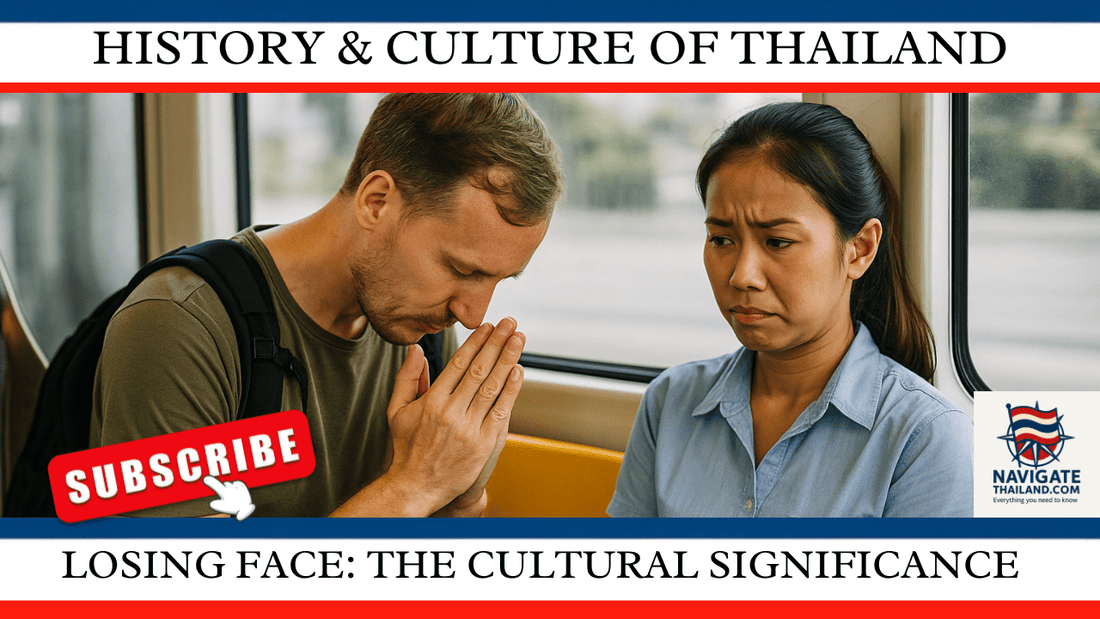
Losing Face in Thailand: The Cultural Significance of Embarrassing a Thai Person
Share
Thailand is renowned for its rich culture, friendly people, and a deeply rooted sense of respect and harmony in daily life. As a traveller, one of the most important cultural concepts you need to be aware of is “losing face.” In Thai society, saving face—or avoiding embarrassment and maintaining one’s dignity—is of paramount importance. Understanding the concept of face is crucial for anyone visiting or living in Thailand, as it affects not only social interactions but also business dealings, friendships, and everyday exchanges.
This blog explores the cultural significance of losing face in Thailand, what it means for travellers, and how to navigate social situations in a way that shows respect for Thai customs and values. Whether you’re negotiating at a market or engaging in a conversation with locals, being mindful of this concept can enrich your travel experience and foster positive relationships.
What Does “Losing Face” Mean in Thai Culture?
In Thailand, “losing face” refers to any situation in which a person’s dignity, reputation, or honour is diminished, often through public embarrassment, confrontation, or criticism. The concept of face is closely tied to one’s social standing, and losing face can have significant emotional consequences, not only for the individual but for those around them.
Thais, like many other cultures in East and Southeast Asia, place a high value on maintaining social harmony. Direct conflict, public criticism, or any action that causes someone to feel ashamed or humiliated is avoided at all costs. If a person feels they have lost face, they may feel embarrassed, resentful, or even humiliated. This can damage relationships and social standing, which is why maintaining face is such an integral part of Thai social interactions.
Cultural Roots of “Losing Face”
The concept of face in Thailand is influenced by Buddhist teachings and a desire to avoid conflict and maintain inner peace. Thai society values kreng jai (เกรงใจ), a term that translates to “consideration for others” or “respect.” Kreng jai encourages people to avoid actions that might inconvenience or upset others, fostering a harmonious and non-confrontational atmosphere.
Additionally, Thai culture places a strong emphasis on hierarchy and respect for elders, teachers, monks, and those in positions of authority. Losing face in front of someone higher up in the social hierarchy can be particularly distressing, as it disrupts the balance of power and respect.
Common Situations Where Face Can Be Lost
As a traveller in Thailand, there are several situations where you may inadvertently cause someone to lose face. Here are some examples to be mindful of:
1. Public Criticism or Disagreement: Pointing out someone’s mistake or engaging in a public argument can cause them to lose face. Thais tend to avoid direct confrontation and will often choose to remain silent or offer a polite smile rather than openly disagree.
2. Embarrassing Someone in Front of Others: Making a joke at someone else’s expense, correcting them in front of others, or even giving direct feedback that might be perceived as criticism can cause embarrassment and lead to a loss of face.
3. Refusing Hospitality: In Thai culture, hospitality is taken seriously. If someone offers you food, a gift, or a favour, refusing it outright can be seen as disrespectful and cause the host to lose face. Even if you’re not hungry or don’t need the favour, it’s best to accept politely and with gratitude.
4. Being Overly Direct in Business: In business settings, direct and forceful negotiation tactics can be viewed as aggressive and disrespectful. Business in Thailand often involves building relationships and trust first, with an emphasis on maintaining politeness and avoiding conflict.
How to Avoid Causing Someone to Lose Face
As a traveller, it’s important to be aware of how your words and actions might be interpreted. Here are some tips to help you navigate Thai social situations without inadvertently causing someone to lose face:
1. Avoid Public Confrontations: If you have a disagreement with someone, try to address it privately and in a non-confrontational manner. This allows the other person to maintain dignity while resolving the issue.
2. Be Mindful of Tone and Body Language: In Thailand, non-verbal communication is key. A calm, respectful tone and gentle body language go a long way in showing respect. Avoid raising your voice or using overly dramatic gestures.
3. Offer Compliments Instead of Criticism: If you need to offer feedback, try to do so in a way that highlights positive aspects first. Offering a compliment before giving constructive criticism helps soften the blow and preserves face.
4. Accept Hospitality Graciously: Even if you don’t need the food or drink offered to you, it’s important to accept it with thanks. If you really can’t accept it, offer a polite explanation rather than outright refusal.
5. Stay Calm in Stressful Situations: Whether you’re dealing with a misunderstanding at a market or a delay in services, staying calm and patient is essential. Showing frustration or anger, especially in public, can cause others to lose face and will likely make the situation worse.
Fun Fact: In Thailand, smiling is a common way to defuse tension or awkwardness in social situations. The “Thai smile” is often used to maintain harmony, even when someone is feeling uncomfortable.
What to Do If You’ve Caused Someone to Lose Face
If you think you’ve accidentally caused someone to lose face, don’t panic. Thais are generally very forgiving, especially towards foreigners who may not fully understand the nuances of their culture. A simple and sincere apology can go a long way. However, it’s best to apologise privately rather than making a big public gesture, as this can further highlight the loss of face.
Additionally, offering to make amends through small acts of kindness or showing extra politeness in future interactions can help rebuild goodwill.
Why Is Face So Important in Thailand?
In Thai society, losing face is about more than just personal embarrassment—it’s tied to one’s relationships, reputation, and social standing. The importance of saving face is linked to the desire for social harmony, respect, and maintaining positive relationships. Losing face doesn’t just affect the individual—it can reflect poorly on their family, colleagues, or group, making it a community issue rather than just a personal one.
For travellers, understanding this concept is key to making meaningful connections with locals and respecting their customs. Whether you’re dining at a local restaurant, bargaining at a market, or attending a social event, being mindful of face will help you navigate interactions with grace and respect.
Conclusion
The concept of “losing face” plays a significant role in Thai society and reflects the country’s cultural emphasis on harmony, respect, and non-confrontation. As a traveller, being aware of this social dynamic will not only help you avoid misunderstandings but will also enhance your experience in Thailand. By showing respect, avoiding direct confrontations, and practising humility, you can navigate Thai social situations with ease and grace.
Have you experienced a moment where you or someone else lost face during your travels? Share your experiences in the comments below! Don’t forget to share this blog with fellow travellers on social media and stay tuned for more cultural insights. Plus, subscribe to our YouTube channel, where we turn our blogs into videos for a deeper dive into all things Thailand!
References:
• Tourism Authority of Thailand – “Understanding Thai Culture and Customs”
• Bangkok Post – “Social Etiquette in Thai Society”
• National Geographic – “Southeast Asian Cultural Practices and Traditions”
Read more of our Thailand blog series:
Thai Food Guide:Traditional Recipes and Street Eats
Everything Travellers Need to know
Thailand travel ebooks and language guides
Thailand Travel Apparel & Souvenir Gifts
Subscribe to our YouTube channel Navigate Thailand to see our most popular Thailand travel blogs turned into videos:
Navigate Thailand YouTube channel
















































































































































